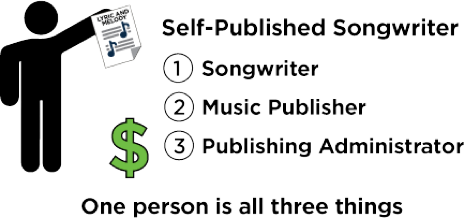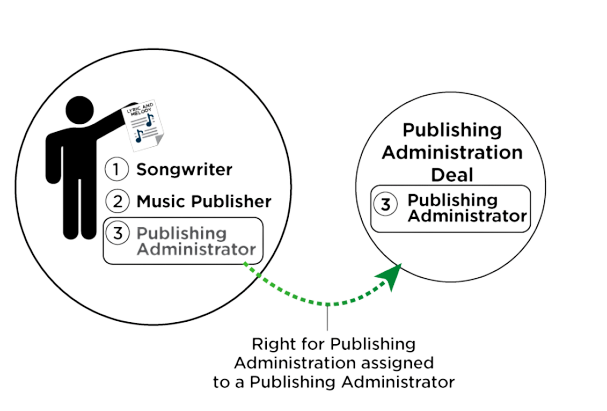It all starts with a copyright
-
The more legal definition is: A copyright is a type of intellectual property that gives its owner the exclusive right to copy, distribute, adapt, display, and perform a creative work for a limited time. The creative work may be in a literary, artistic, educational, or musical form. The copyright for the creative work comes into existence when that creative work is made tangible.
But like with most legal definitions it’s hard to really understand what a copyright is and how it applies to a song or to a spoken word comedy routine.
So let’s take another approach and start with a song.
Imagine you have written a new song that only exists in your head. This song is not yet “tangible”. You can’t touch it or hold it. But as soon as you write the song down or record it, the song becomes "tangible” and instantly gets a copyright. The same holds true for a spoken word comedy routine.
But, keeping with a song, the person who wrote the song has three distinct roles:
Songwriter
Because they wrote the song
Music Publisher
Because they own the song
Publishing Administrator
Because they license and collect the money for the use of the song
-
In the United States, when a song is written down or recorded (i.e., becomes “fixed in a tangible medium of expression”) it instantly gets a copyright. The copyright has a bundle of six types of legal rights that may work in tandem, or individually, to generate royalties for the song. A song is also frequently called a “musical composition” or just “composition”.
These six rights types are the rights of:
Public Performance
Reproduction
Public Display
Derivatives
Digital Transmission
Distribution
How an entity wants to use the song dictates which of the six rights types they must have. For example, FM radio must have the right of Public Performance whereas an interactive streaming service like Apple Music or Spotify must have both the right of Public Performance and the right of Reproduction.
These six rights types dictate how the song can be used, when a license is needed, and in some cases what the pre-set royalty rates are. The money collected for the use of the song is sometimes called “Music Publishing” royalties.
Licensing and collecting the money for the six rights types is called publishing administration.
-
Recall that the person who wrote the Composition/Song has three distinct roles:
Songwriter
Because they wrote the composition/song
Music Publisher
Because they own the composition/song
Publishing Administrator
Because they license and collect the money for the song
A “self-published” songwriter is a person who wrote the song, owns the song, and also (whether they know it or not), is responsible for licensing and collecting the money earned for their song from the six types of rights listed above.
A “Publishing Administrator” is an entity or person that is hired by, and works for, the Music Publisher (the owner) to license their song copyrights and collect their money.
Self-Published Songwriter

This is a person who wrote a song, owns the song, and also (whether they know it or not) is responsible for licensing and collecting the money earned for their song from the six types of rights listed above.
Publishing Administrator

A songwriter may choose to enter into a deal with a Publishing Administrator. The Publishing Administrator now collects the money for the six types of rights listed above. When a Songwriter enters into a Publishing Administration deal, the person is still the Songwriter (as they wrote the song) and still the Publisher (as they own the copyright to the song), but the Publishing Administrator now licenses and collects the money for the song. The Publishing Administrator takes a cut of the money it collects as a fee for its service, and then passes the rest back to the person that is both the Songwriter and Publisher. Publishing Administrators typically work for a large number of Songwriters at the same time.
-
A self-published songwriter or music publisher may choose to enter into a deal with a Publishing Administrator to license their songs and collect the money those songs generate via the six rights types listed above.
When a songwriter or music publisher hires a Publishing Administrator, the Publishing Administrator licenses the copyrights and collects the money for the six types of rights listed above for specific countries. The Publishing Administrator takes a percentage of what it collects as a fee for its service. This is called an administration fee.
If the Publishing Administrator licenses the copyrights and collects the money from the use of the composition in all territories of the world, this is called a Global Publishing Administration deal.
When a Songwriter enters into a Global Publishing Administration deal (or a Publishing administration deal that is not for the world), the person is still the Songwriter (as they wrote the song) and still the Publisher (as they own the copyright to the song), but the Publishing Administrator now licenses and collects the money for the song in the specified territories in the world.
-
Royalties are generated via the entity that used the music or song. Some examples are:
- TV stations broadcasting a TV show with music in it
- Venues where bands play live, elevators where music is played
- Radio stations playing music or comedy routines
- A stream on the internet via TikTok, Spotify, Apple, YouTube, Facebook etc
- A download on the internet like iTunes, manufacturing vinyl, CDs etc
- Exercise companies using music in the exercise class either in person or in their on-line classes (like Peloton, Apple Fitness, Equinox etc)
- Restaurants and retail stores playing music
- The creation of sheet music
- The lyrics of the songs appearing on-line or in print
...and more
The entity that plays the music gets a license to use it and then calculates the royalty based on the legal terms in the licensing agreement. The money earned can then take many different paths to(sometimes) get to its final destination. For example, depending on how the Publishing Administrator created their pipelines and relationships, the royalties earned from the stream of a song in France could go from a music service like Spotify to a music rights organization in France called SACEM. SACEM takes a cut and then passes on the leftover money to one of its members called a “sub-publisher”. That sub-publisher takes another cut before they pass it on to the Publishing Administrator. The Publishing Administrator then takes another cut before passing what’s left to the self-published songwriter/music publisher.
Each time the money or license passes from one hand to the next, it creates more inefficiencies, lost data, lost revenue, higher true administration fees, and a longer period for the money to get into the self-published songwriter/music publisher’s pocket. In addition, with each layer between the songwriter/music publisher and the entity that used their music there is less and less transparency as information does not make it from one entity to the next and ultimately does not make it to the self-published songwriter/music publisher. Finally, for digital music services, as there is not a direct relationship between the Publishing Administrator and the digital music service, the information getting passed from the digital music service to the next entity and so on causes the information and data to degrade in quality until finally the money is paid back to a local music collection agency. At that point, the local collection agency doesn’t know whose money it is due to the bad or missing data, so they stick it to the side and call it “black box” money which they ultimately hand to others that did not earn it.
-
In the legacy music publishing model, money that is earned for a copyright is paid by the entity that used the music to another collection entity that is local in that country. For example, money earned from the stream of a song in France is usually paid to a local French music rights collection entity called SACEM. If SACEM does not know who to pay the money to, SACEM still takes a percentage of the money and then puts that money aside and calls it “black box” money. After a period of time, if the local agency does not figure out who and/or where to pay the money, the local agency usually gives the money to other entities that did not earn it based on those entities’ local market share.
Around the world estimates put the amount of money earned but not paid at over $3.5 billion.
Sadly, as there is no penalty for the songwriter/music publisher not getting paid their money, this “black box” money has become a new income stream for those with large market share. The recipients of the “black box” money benefit when local agencies around the world are unable to figure out who to pay because they take other songwriter/music publishers 'money that they did not earn and place it in their own pockets.
